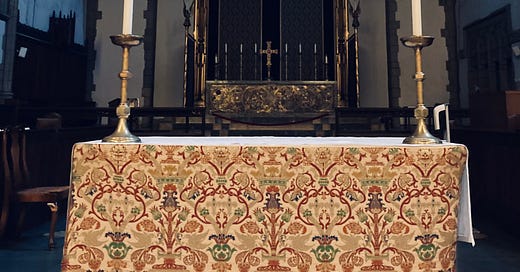previously published in Ethika Politika
*We’re being hyperbolic here. Nothing against Evangelicals. We just want more dialogue with Mainlines.
A quick visit to one of Manhattan’s many Episcopalian churches will exemplify mainline progressive Protestantism’s growing interest in traditional liturgy and sacramentality. Most of Manhattan’s Episcopal churches date back to the seventeenth and eighteenth centuries-the peeling paint and musty wood testifying to their rich history. Upon entering one parish in Washington Heights, I was immediately overwhelmed by the light that cascaded down through a stained glass window situated above an elaborate, ceiling-length altar piece. The beauty of the interior penetrated my heart, a prayer slipping off my lips as I wondered in amazement who could be responsible for having inspired such a masterpiece.
After introducing myself to one of the deacons, I learned that the main Sunday Mass was a High one, with all the bells and whistles one might find at a Tridentine Catholic Mass. The younger parishioners, she told me, were looking for something more substantial than your average praise and worship fare. The more traditional forms of liturgy offer a sense of stability in the face of the ever-changing worship services in the Protestant landscape. While communicants are allowed to receive the Eucharist “on their own terms,” she told me that she personally believes in the Real Presence of the Eucharist, which for her serves as a concretization of her faith in the Gospel. While some, she recognized, may not be in the same place in their spiritual journey, the ultimate fulfillment of the faith is found in Christ’s gift of self to humanity in the Eucharist.




